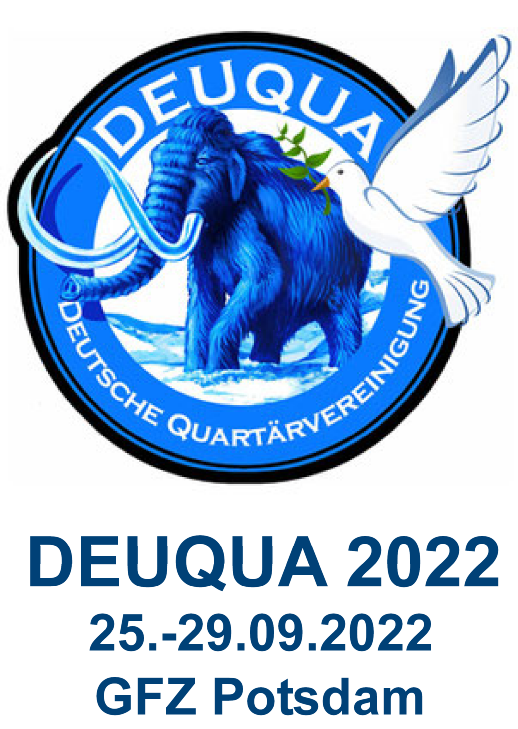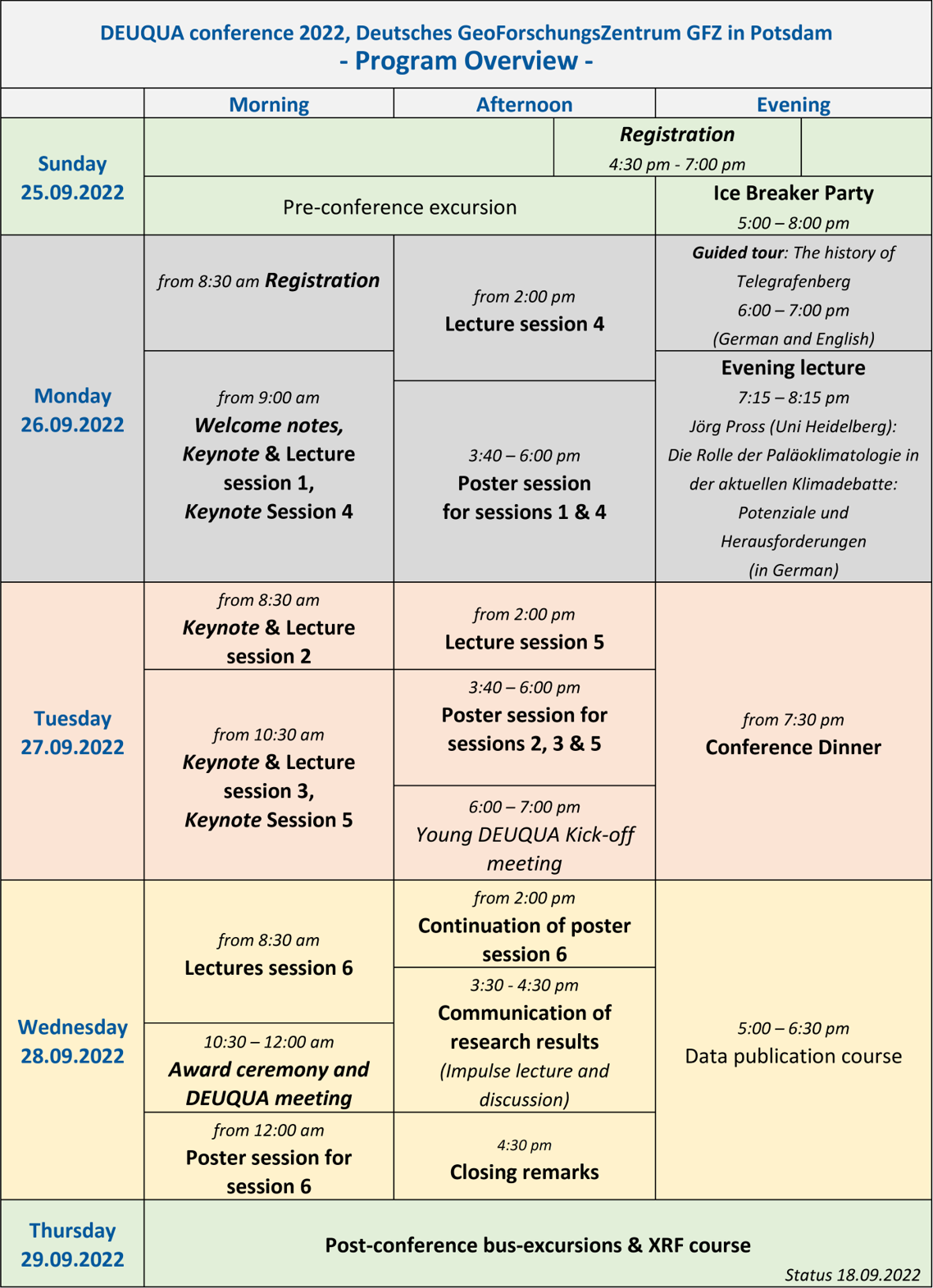Sessions for lectures and posters
The abstract volume is available online. For sustainability reasons, there will be no print version.
Important information for the poster contributions: The poster format is A0 upright. Language can be German or English.
Important information for the presentations: Please provide the lecture presentations on a USB stick, ideally in PowerPoint (*.ppt, *.pptx), in 16:9 or 4:3 format. With the help of our service team, copy your presentation onto the presentation computer during the breaks before your session. It is not possible to use your own laptops.
Detailed conference program:Download
Program
Location: Potsdam and surroundings
- 10:00 - 16:30 pre-conference bike excursion VE1
Location: GFZ, Lecture hall building, house H
- 16:30 - 19:00 registration
- 17:00 - 20:00 ice breaker party
Location: GFZ, Lecture hall building, house H
- 08:30 - 09:00 registration
- 09:00 - 09:30 opening / welcome note
- 09:30 - 10:00 keynote: Emilie Capron
- 10:00 - 11:00 lecture session
- 11:00 - 11:30 coffee break
- 11:30 - 12:30 lecture session
- 12:30 - 13:00 keynote: Yoshi Maezumi
- 13:00 - 14:00 lunch break
- 14:00 - 15:20 lecture session
- 15:20 - 18:00 coffee break & poster session for session 1 and 4
- 18:00 - 19:00 Guided tour Telegrafenberg (German & English)
- 19:15 - 20:15 public evening lecture: Jörg Pross
Location: GFZ, Lecture hall building, house H
- 08:30 - 09:00 keynote: Monica Ionita‐Scholz
- 09:00 - 10:00 lecture session
- 10:00 - 10:30 coffee break
- 10:30 - 11:00 keynote: Siwan Davies
- 11:00 - 12:20 lecture session
- 12:30 - 13:00 keynote: Sibylle Knapp
- 13:00 - 14:00 lunch break
- 14:00 - 15:20 lecture session
- 15:20 - 18:00 coffee break & poster session for session 2, 3 and 5
- 18:00 - 19:00 “Junge DEUQUA kick-off meeting”
- 19:30 - 22:00 conference dinner
Location: GFZ, Lecture hall building, house H
- 08:30 - 10:10 lecture session
- 10:10 - 10:30 coffee break
- 10:30 - 12:00 award ceremony and DEUQUA meeting
- 12:00 - 13:00 poster session for session 6
- 13:00 - 14:00 lunch break
- 14:00 - 15:00 poster session for session 6
- 15:00 - 15:30 coffee break
- 15:30 - 16:30 lecture & discussion "From science to society"
- 16:30 - 16:45 closing remarks
- 17:00 - 18:30 short course K1 "Overcoming challenges in publishing research data"
- bus excursions
NE1,NE2, NE3, NE4 - day course K2 "Advanced XRF data analyses using Xelerate"
- ice breaker party
- public evening lecture: Jörg Pross
- “Young DEUQUA kick-off meeting”
- conference dinner
- award ceremony and DEUQUA meeting
Convener: Claudia Wrozyna & Cécile Blanchet
Keynote: Dr. Emilie Capron, Université Grenoble
Today, we live in a constantly warming world due to rising anthropogenic greenhouse gas emissions. The Quaternary encompasses several warmer-than-present time intervals, which offer unique insights into the climatic and environmental conditions of warmer worlds and help assessing the skillfulness of numerical climate models. In this session, we will discuss the possible drivers and mechanisms underlying the observed changes in ocean and atmospheric circulation, and their impacts on marine and terrestrial ecosystems. Warm climatic periods include short, centennial-scale fluctuations like the Roman or Medieval Warm Periods or the Holocene climatic optimum but also past interglacial like the Eemian (MIS 5e) or the Holsteinian (MIS 11). Proxy-data records from all kind of geo-archives and all parts of the world as well as approaches combining data with model simulations are welcome.
Convener: Claudia Wrozyna & Cécile Blanchet
Keynote: Dr. Monica Ionita-Scholz, AWI Bremerhaven
As hinted by IPCC reports, we may stand at the brink of a major and rapid climatic disruption. Climate changes occurring within a few years or decades in the Earth’s history like, for example, at the onset of Late Glacial and Holocene warming provide critical clues on the timing, dynamics and triggers of such changes. Periods of abrupt climatic shifts may be associated with increasing frequencies and amplitudes of extreme hydrometeorological events. This session invites presentations about abrupt climate changes in the Quaternary and extreme meteorological event reconstruction from various geo-archives and study areas.
Convener: Daniela Müller & Achim Brauer
Keynote: Prof. Siwan Davies, University Swansea
Synchronising ice core, terrestrial and marine climate proxy records is the key for deciphering between regional leads and lags, and synchronous responses to past abrupt climate changes. In this respect, precise dating and high-resolution chronological constraints are of utmost importance, when exploring the spatiotemporal variability of climate change. This session focusses on the advances made in the research fields of direct dating methods (e.g., radiocarbon, U-series), annual-resolution chronologies (e.g., varves, ice layers, tree rings), and the precise integration of proxy records (e.g., through tephrochronology, cosmogenic isotopes, palaeomagnetic excursions).
Convener: Elisabeth Dietze & Julia Meister
Keynote: Dr. Yoshi Maezumi, MPI Jena
Since several millennia humans transform the landscapes of central Europe and across the world. These transformations have affected sedimentation in geoarchives in various ways and, thereby, also influenced environmental and climate proxy-based reconstructions. Deforestation, for example, affects the hydrological cycle and can fundamentally change deposition processes in sedimentary basins. On the one hand, this can mask climatic signals in sediment records, but, on the other hand, cultural and societal developments in human prehistory and history can be traced in detail. To achieve this, it is crucial to distinguish between anthropogenic and climatic signals in geoarchives. In the session, we will discuss approaches and strategies to disentangle effects of human-driven land cover changes and further human activities from climate-induced changes in various geoarchives. We invite contributions on classical and novel proxies for both human activity and climate change.
Convener: Margret Fuchs & Michael Dietze
Keynote: Dr. Sibylle Knapp, TU München
Climatic and global change is implemented by the processes acting at the surface of the Earth. Processes that shape hillslopes, fluvial channels and coastlines are the agents that mobilise, transport and deposit sediments, sediments that ultimately form the geological record that is used to interpret landscape evolution and the impact of past environmental change. In this session we aim to focus on i) the consequences of environmental change on process dynamics as interpreted from sedimentary deposits and ii) implications from actualistic, process-oriented research regarding the interpretation of the geological record. We welcome contributions that resolve the initiation, nature and evolution of transients, convert proxies to process rates and vice versa, or present conceptual models that foster our understanding of the links between processes and the record they create.
Convener: Henrik Rother & Christian Hoselmann
Text only available in german.




